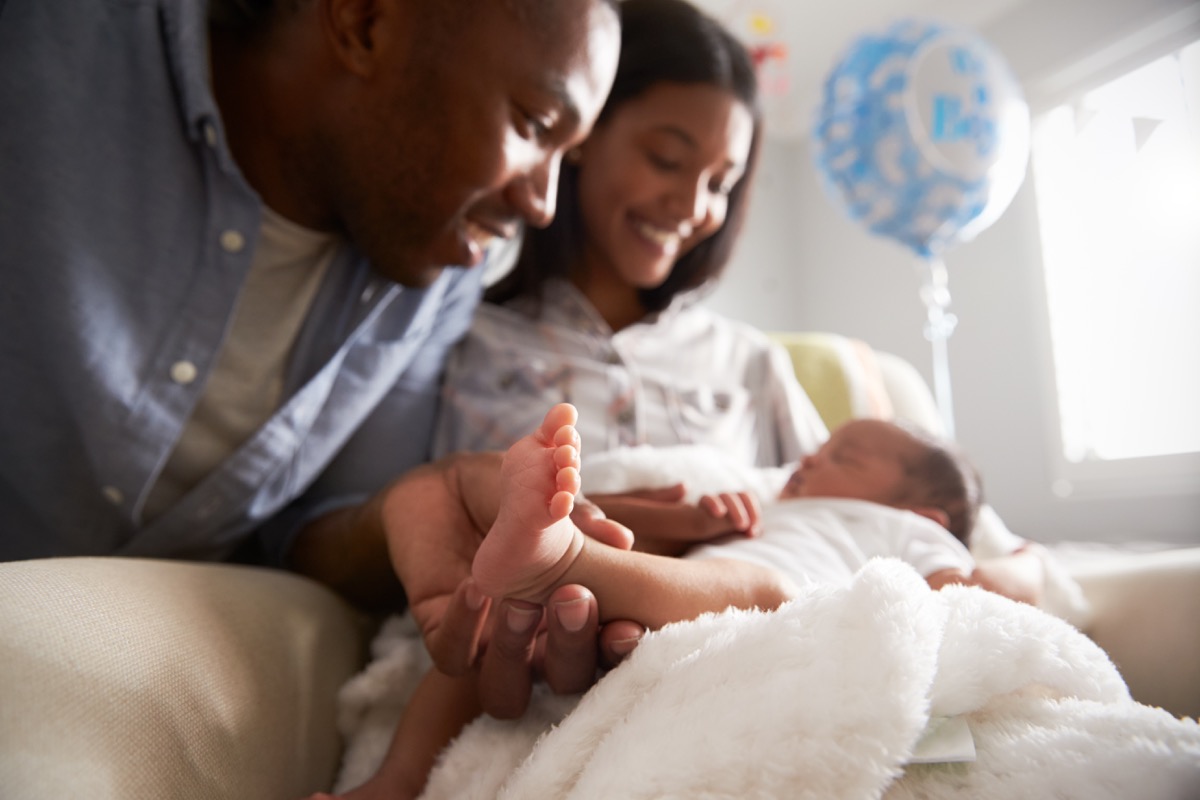You're Twice as Likely to Get Divorced If You Did This Before Marriage
It causes lower marital satisfaction and worse communication, a new study reveals.

With marriage and divorce rates both in decline, it seems couples are biding their time before tying the knot in hopes of a better union. However, not all marriages end happily ever after and research shows that certain factors tip the scales in favor of a breakup.
In fact, a 2020 study published in the Journal of Family Psychology says there's one thing you may do before the marriage even begins that doubles your chances of getting a divorce. They say if you and your partner have done this one thing prior to getting hitched, your risk of a split is twice as high compared with couples who have not. Read on to find out which factor may increase your chances of a breakup.
RELATED: Getting Married at This Age Led 45 Percent of Couples to Divorce, Study Says.
If you and your spouse had kids prior to marriage, you're twice as likely to get divorced.

The 2020 study set out to analyze the effects on relationships of having children prior to marriage. "An increasing number of couples in the United States are entering their first marriage having already had a child together, raising important questions about whether and how these couples' marriages differ from newlywed couples who enter marriage without children," the researchers wrote. In fact, the percentage of births to unmarried mothers has more than doubled between 1980 and 2014, increasing from 18 percent to 40 percent during that time frame, the team noted.
After reviewing five waves of data collected in the first four and a half years of marriage of 431 couples, the team discovered that the divorce rate was twice as high among couples who had shared biological children at the time of marriage (19.1 percent) compared with those who did not have children at the time of marriage (9.5 percent). "First-married newlywed couples who start their marriage with children have significantly worse marital outcomes over time relative to first-married newlywed couples who start their marriage without children, consistent with earlier findings," the researchers concluded.
RELATED: If You and Your Spouse Do This Together, You're 3.5 Times More Likely to Divorce.
Premarital parenthood was associated with lower marital satisfaction.

Likely contributing to those higher divorce rates, couples who had children at the time of marriage self-reported lower levels of satisfaction in the marriage. "Marital satisfaction was conceptualized as spouses' global sentiment toward the relationship and was assessed by summing responses on an eight-item questionnaire," the team explained.
The researchers also observed poorer communication within couples who entered marriage with a shared biological child. "Communication was less effective, less positive, and more negative than couples entering marriage without children," the researchers concluded.
They considered the positive aspects of having kids prior to marriage, too.

The team says that the link between premarital parenthood and higher divorce rates was not a foregone conclusion. They entertained the opposite theory as well, that "because couples who enter marriage with children have more experience coping with stress, they may better weather the transition to marriage and other stressors during the newlywed years."
However, in the end, they attributed their findings to a range of stresses associated with having children sooner, or outside of a marriage. "Meta-analytic findings indicate that having children places unique demands on couples and is associated with lower marital quality, suggesting that couples entering marriage with children will experience more negative marital outcomes (e.g., lower marital quality, higher marital dissolution) over the early years of marriage relative to couples entering marriage without children," they wrote.
They added that couples who enter marriage with children may also be at higher risk of divorce when the relationship "only proceeded to marriage because of the child, not because of the couples' relationship per se."
RELATED: For more relationship content delivered straight to your inbox, sign up for our daily newsletter.
The study only analyzed low-income couples.

The study used a sample of "ethnically diverse, first-married newlywed couples," and the research team reported that the "differences [in divorce rate] remained robust after controlling for several demographic differences (race, age, education, household income, work status, relationship length, premarital cohabitation)." However, it is worth noting that all of the couples included in the study were classified as "low-income," defined as having a median household income no more than 160 percent of the federal poverty level.
Though limiting their subject pool to one economic demographic helped highlight the effects of premarital parenthood within that group, it means more research would be required to understand the effects on couples of higher income. After all, it stands to reason that some of the unique stresses experienced by parenting newlyweds might be alleviated in higher income groups. "A robust literature shows that stressors like child rearing are negatively associated with romantic relationship functioning, and these stressors may be particularly salient and meaningful among disadvantaged couples like those studied here," the researchers wrote.
Finally, if you did have children prior to marriage, know that your relationship is not a statistic, and is still ultimately in your hands. Over 80 percent of couples with children did not divorce during the study period—meaning the odds of a long-term union are still in your favor.
RELATED: Not Doing This Led 53 Percent of Couples to Divorce, Study Says.





















